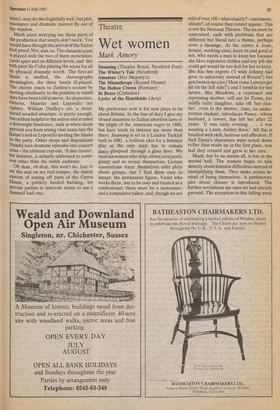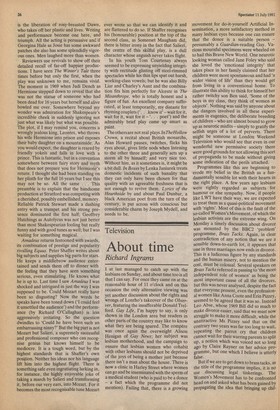Theatre
Wet women
Mark Amory
Steaming (Theatre Royal, Stratford East) The Winter's Tale (Stratford) Amadeus (Her Majesty's) The Misanthrope (Round House) The Hollow Crown (Fortune) In Boxes (Cottesloe) Lyrics of the Hearthside (Arts) My preference now is for new plays to be about Britain. In the line of duty I give my closest attention to Italian abortion laws or the plight of the American negro in 1890, but here tends to interest me more than there. Steaming is set in a London Turkish bath in 1981, a brilliant idea for a feminist play as the only male has to remain dimly glimpsed through a glass door. We meet six women who strip, swim(areal pool), gossip and so reveal themselves. Certain conventions force themselves onto plays about groups, but I find them easy to accept: the permanent figure, Violet who works there, has to be cosy and treated as a confessional; there must be a newcomer, and a compulsive talker, and, though we are told of over 100—what exactly? — customers, clients?, of course they cannot appear. This is not the National Theatre. The six must be contrasted, each with problems that are different but blend into a theme, perhaps even a message. At the centre is Josie, honest, working-class, keen on and good at sex, who needs a man to keep her because she likes expensive clothes and any job she could get would be too dull for her to keep. She has few regrets CI wish Johnny had gone to university instead of Borstal') but gets beaten up a lot Mow come I always get hit on the left side?') and I tremble for her future. Mrs Meadows, a repressed and repressing mother, will not let Dawn, her mildly batty daughter, take off 'her plastics', even in the shower. Jane, an underwritten student, introduces Nancy, whose husband, a lawyer, has left her after 22 years: 'It was early evening . . . I was wearing a Laura Ashley dress.' All this is handled with skill, humour and affection. If Nell Dunn's characters were noted down rather than made up in the first place, you feel they relaxed and grew in her care.
Much, but by no means all, is lost in the second half. The women begin to talk directly about feminist difficulties instead of exemplifying them. They make points instead of being themselves. A perfunctory plot about closure is introduced. The further revelations are ones we had already guessed. The exception to this falling away is the liberation of rosy-breasted Dawn, who takes off her plastic and lives. Writing and performance become one here, and triumph. All the acting is persuasive and if Georgina Hale as Josie has some awkward patches she also has some splendidly vigorous ones. Men laughed more than women.
Reviewers use revivals to show off their detailed recall of far-off happier productions. I have seen The Winter's Tale three times before but only the first, when the play was unknown to me, remains vivid. The moment in 1969 when Judi Dench as Hermione stepped down to reveal that she was not the statue of someone who had been dead for 16 years but herself and alive bowled me over. Somewhere beyond my wonder was admiration for Shakespeare's incredible cheek in suddenly ignoring not just what was likely but what was possible. The plot, if I may remind you, concerns a wrongly jealous king, Leontes, who throws his wife Hermione into prison and exposes their baby daughter on a mountainside. As you would expect, the daughter is reared by friendly yokels and falls in love with a prince. This is fantastic, but in a convention somewhere between fairy story and myth that does not prepare you for Hermione's return. I thought she had been standing on her plinth for the full 16 years but I see this may not be so. All the same . . . This preamble is to explain that the handsome production at Stratford was competing with a cherished, possibly embellished, memory. Reliable Patrick Stewart made a dashing entry with a trumpet and his strong presence dominated the first half; Geoffrey Hutchings as Autolycus was not just better than most Shakespearian fooling but really funny and with good tunes as well; but I was waiting for something magical.
Amadeus returns festooned with awards, its combination of prestige and popularity rivalling Equus. Peter Shaffer writes about big subjects and supplies big parts for stars. He keeps a middlebrow audience entertained and sends them off to dinner with the feeling that they have seen something serious, even stimulating. He knows what he is up to. Last time I saw Amadeus I was shocked and intrigued in just the way I was supposed to be. Could Mozart really have been so disgusting? Now the words he speaks have been toned down CI could feel it unsettled the audience') and the performance (by Richard O'Callaghan) is less aggressively irritating. So the question dwindles to 'Could he have been such an embarrassing ninny?' But the big part is not Mozart but Salieri, a supremely successful and professional composer who can recognise genius but knows himself to be mediocre. It is a tough word, but by the highest standards that is Shaffer's own position. Neither his ideas nor his language lift him into the highest flight. There is something safe even ingratiating lurking in, for instance, the highly enjoyable joke of taking a march by Salieri and transforming it, before our very ears, into Mozart. For it becomes the most recognisable tune Mozart ever wrote so that we can identify it and are flattered to do so. If Shaffer recognises his (honourable) position at the top of the second class, as Somerset Maugham did, there is bitter irony in the fact that Salieri, the centre of this skilful play, is a dull character whose anguish never takes flight.
In his youth Tom Courtenay always seemed to be expressing unyielding integrity with rectitude glinting off steel-rimmed spectacles while his thin lips spat out harsh, working-class vowels; but he was also Billy Liar and Charley's Aunt and the combination fits him perfectly for Alceste in The Misanthrope, who is totally honest and a figure of fun. An excellent company suffocated, at least temporarily, my distaste for rhyming couplets (` . . .know it' — wait for it, wait for it, wait for it — `. . . poet') and the admirably brief play came up smart as paint.
The others are not real plays.In TheHollow Crown, a recital about British monarchs, Alan Howard pauses, twitches, flicks his eyes about, gives little nods when listening to the other three and generally acts up a storm all by himself; and very nice too. Without him, as it sometimes is, it might be a bit dull. In Boxes by Lenka Janiurek treats domestic incidents of such banality that they can only have been chosen for that quality with an agreeable freshness that is not enough to revive them. Lyrics of the Hearthside by and about Paul Dunbar, a black American poet from the turn of the century, is put across with conscious but considerable charm by Joseph Mydell, and needs to be.



































 Previous page
Previous page